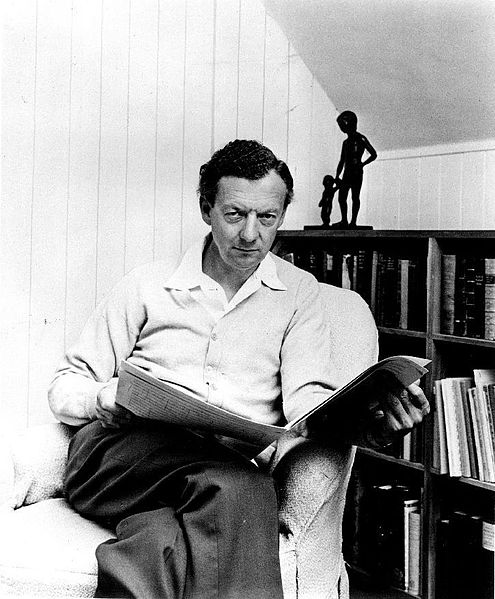Music with Ease > 20th Century Opera > Billy Budd (by Benjamin Britten)
Billy Budd
(by Benjamin Britten)
Opera originally in four acts and later revised as a prologue, two acts and an epilogue.
Original version composed in 1950-51 and revision composed in 1960.
Libretto written by E. M. Forster and Eric Crozier after the 1891 story Billy Budd, Foretopman by American writer Herman Melville.
Premiere: (Original Version) December 1, 1951, in Covent Garden, London, U.K.; (Revised Version) January 9, 1964 on BBC Radio.
Prologue
Captain "Starry" Vere, now an old man, casts his mind back over his career and recalls a disturbing event that happened while he was in command of the British warship, H.M.S. Indomitable, during the French wars against Napoleon in 1797.

Benjamin Britten, c. 1968.
Photo credit: Publicity photo published by London Records (U.K.). Photographer: Hans Wild for High Fidelity magazine (U.S.).
Act 1
Newly press-ganged recruits come aboard the H.M.S. Indomitable. One of these is Billy Budd, a young, strong and handsome man who impresses everyone including Claggart, the Master-at-Arms, but who suffers from a stammer when frightened.
Billy is sent to the foretop and, exhuberant, Billy shouts a farewell to his old ship: "Farewell, old Rights of Man". The officers are alarmed, thinking that Billy is referring to radical ideas (rights of man) from the French Revolution that had just occurred.
Billy's fellow crew members warn him to be wary of Claggart but assure him that Captain Vere is a good man. Claggart instructs the ship's corporal Squeak to harrass Billy and keep a close watch on him.
Two officers tell Vere about Billy's reference to the "rights of man" but Vere tells them there is no need to worry.
Billy discovers Squeak search through his belongings. Squeak threatens Billy with a knife and in response Billy knocks Squeak down. Claggart appears and when Billy's fellow crew members tell him what happened, he is forced to put Squeak in chains.
Following orders from Claggart, the Novice offers Billy money to incite a mutiny. Billy refuses.
Act 2
Claggart goes to see Captain Vere and begins to falsely denounce Billy for attempting mutiny. Vere is irritated by Claggart's sycophantic manner. Suddenly a French frigate is spotted and all the crew rush to their action stations, but then the wind drops and the frigate escapes into the mists.
Claggart continues his complaint about Billy. Although Vere does not believe this, he calls Billy to his cabin. Claggart repeats the accusations to Billy's face. Billy is shocked and enraged and begins to stammer and then is so frustrated at not being able to speak and answer accusations that he suddenly lashes out and strikes Claggart, who falls to the floor -- dead.
Captain Vere knows how much Billy had been provoked by Claggart's accusation but he feels compelled to convene a court martial. Billy speaks in his own defense and pleads with Vere to intervene and save him. But Vere declines to go against the verdict of his fellow officers and Billy is found guilty of murder and condemned to hang.
Billy's friend Dansker warns Billy the crew is about to mutiny and to try and rescue him, but Billy advises them against this, saying it would just lead to more of the crew being executed like him.
At dawn the next morning Billy cries out a blessing to Vere ("Starry Vere, God bless you!") and is then hanged. The crew is restless and is forced at once to disperse.
Epilogue
Years later, Captain Vere laments his actions. He realises that he could have saved Billy but that Billy actually had saved him (by forgiving him before he died).
Study Notes
James Fenton's review, "The sadist and the stammerer", of this opera was published in The Guardian (London) newspaper on 2 December 2005.
The review was quite negative in part and states: "How would Herman Melville have felt about his unfinished novella Billy Budd being turned into a homoerotic opera steeped in cruelty? Utterly baffled."
Share this page:
Author: David Paul Wagner
(David Paul Wagner on Google+)
Music With Ease | About Us | Contact Us | Privacy | Sitemap | Copyright | Terms of Use © 2005-23 musicwithease.com. All Rights Reserved. |
